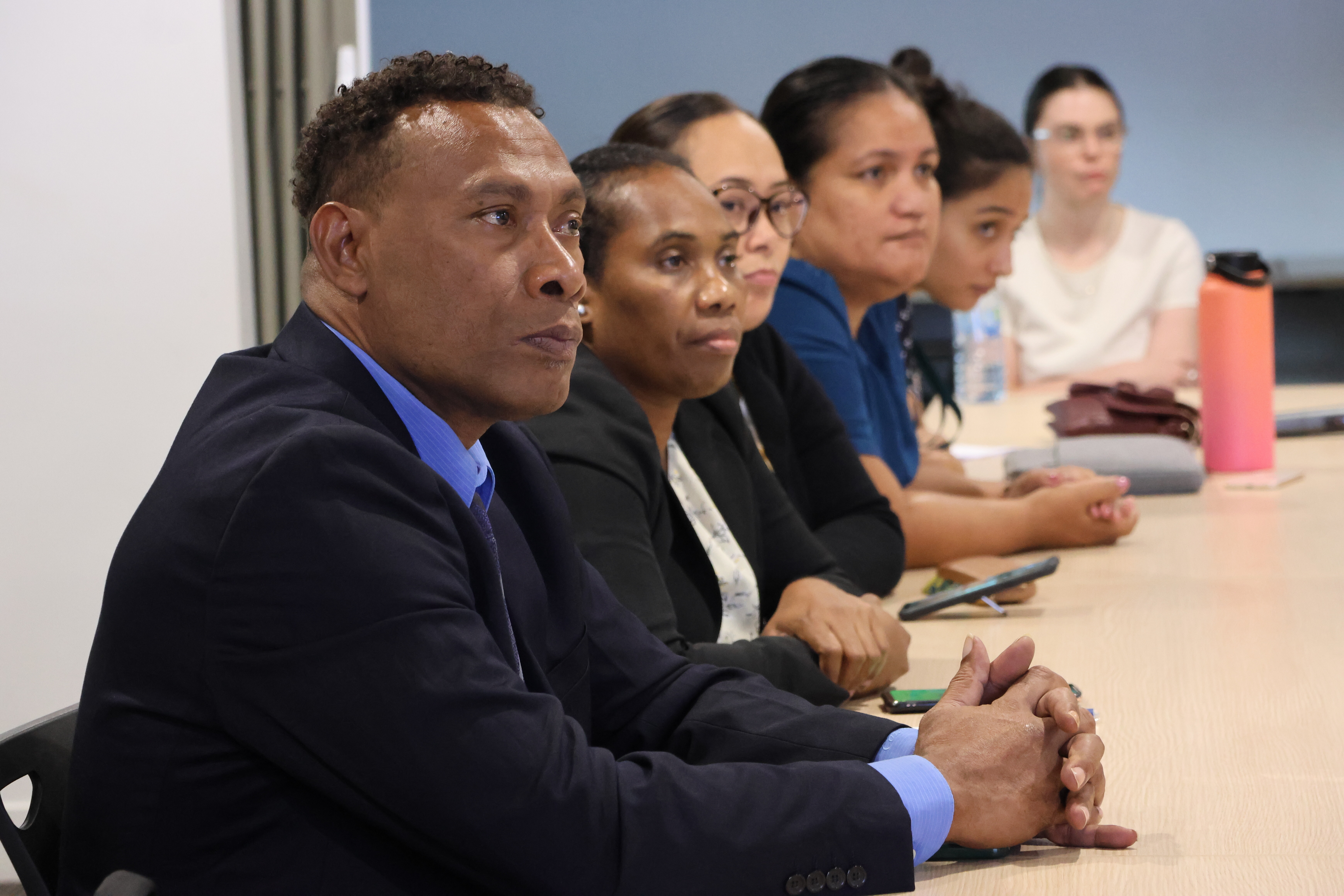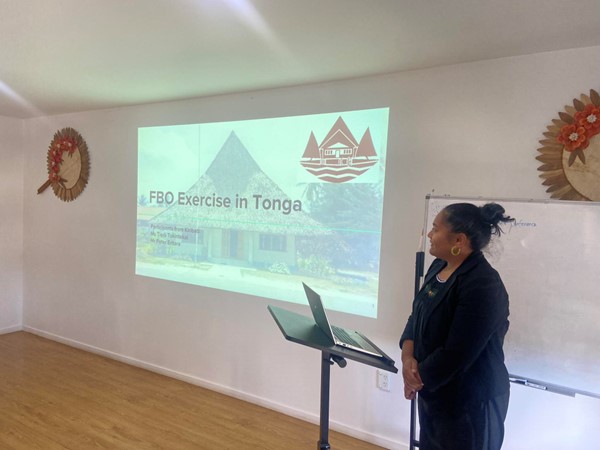Empowering Pacific Parliaments through Floating Budget Office
September 16, 2024

Participants of the Floating Budget Office during their induction and National Budget briefing in Suva, Fiji.
What is a Floating Budget Office?
In the vast expanse of the Pacific, an innovative initiative that continues to revolutionize how parliaments analyze and understand their national budgets. The Floating Budget Office (FBO) is empowering Pacific nations to make more informed decisions about their financial futures. But what exactly is the FBO, and how is it making a difference?
The FBO is a Pacific Parliament-led initiative providing critical collaborative support to parliaments during the review of their national budgets. Upon the request, UNDP facilitates a team of experienced parliamentary researchers from across the region supporting the national parliament capacity in analyzing their budget.

Participants of the Floating Budget Office and staff of Parliament of Fiji outside the Parliament in Suva, Fiji.
Through this effort, parliaments throughout the region will be able to share best practices and information in an inclusive environment.

The Floating Budget Office workshop in Tonga.
The FBO’s work is essential to making sure that public budgets, which are frequently complicated and technical, are transparent and subject to in-depth analysis. The FBO actively engages a variety of stakeholders, including Civil Society Organizations (CSOs), in the budget review process by advocating a whole-of-society approach.
UNDP’s Support
UNDP Pacific has been providing technical assistance to parliaments to build the capacity of legislators to strengthen the relationship between parliament and the executive and civil society since 2017.
FBO supporting via briefs with internal government business discussions, UNDP Pacific has been offering technical assistance to parliaments in efforts to build capacity of legislator.
The budgets are often complex and require in-depth technical experience and knowledge in public finance, the FBO offers collaborative budget analysis to support Pacific parliaments and MPs while strengthening the region’s capacity for parliament research. As a result, UNDP has been considering how to advance a flexible architecture that would allow Pacific Parliaments to exchange knowledge and provide mutual support throughout their different budgetary procedures.
Under the direction of a team leader from the host or national parliament, the researchers create concise studies on important industries, offering unbiased and impartial information to legislators and civil society organizations. The independent approach builds trust and advances a culture of accountability and transparency in budgetary matters, which is essential for effective governance and development.
In 2021, UNDP invested in enhancing the quality of analytical tools available to parliamentary researchers, focusing on strategies to improve the PFBO's budget analysis processes. This resulted in the development an automated budget analysis tool that streamlines the production of budget briefings for MPs, reducing resource demands while increasing the speed and accuracy of the analysis.
FBO in 2024
This year, the FBO was hosted by the Parliament of Tonga in April and the Parliament of Fiji in June consisting of participants from Tonga, Fiji, Kiribati, Vanuatu, Solomon Islands, Australia and New Zealand. This helps the national parliament in staff capacity-building, enhancing knowledge of budget processes in other parliaments, learning about budget analysis practices and templated used in other parliaments and developing and strengthening budget researchers’ network.

The Floating Budget Office team in Tonga.
Participants of FBO
Parliament of Tonga representative Yasivou Kalaniuvalu said she learned that preparation was key – something that she picked up from previous FBO sessions.

Parliament of Tonga representative Yasivou Kalaniuvalu.
“I think it's important to prepare well, to have good preparation. Maybe before joining the FBO team, have a look at all the other prior briefing documents, budget documents of the country that you're going to do analysis on the budget,” she said.
Committee Manager, Environment and Planning Committee from Parliament of Victoria, Australia, Igor Donsen said being part of the FBO was a good opportunity to make some contributions to the climate change portfolio.

Committee Manager, Environment and Planning Committee from Parliament of Victoria, Australia, Igor Donsen.
“I worked in the thematic briefing for climate change which gave me the opportunity to highlight some areas where the government could improve on and what was doing well. I have learned quite a bit in the process as the budget is quite clear and contains a lot of detailed information compared to some of the previous budgets that I have worked with. A lot of these learnings could be applied back home as well,” he said.
Civil Society Organizations (CSOs) workshop
A key factor in forming and bolstering democratic processes is civil society. This is why FBO briefings are not only presented to Parliamentarians but also to varying CSOs. When civil society understands the complex budget documents and decisions, they can play an active role in advocating for various public interests.

Participants from the Civil Society Organisations (CSOs) at the workshop in Suva, Fiji.
By engaging CSOs, the FBO aligns with a whole-of-society and collaborative approach, which is critical for sustainable development. A one-day workshop was conducted by the Parliaments of Tonga and Fiji to help CSOs understand the allocated priorities of the budget and develop a basic understanding of budget analysis. By involving CSOs and the public in the analysis of public finance, FBO ensures that budgets reflect the needs and aspirations of the people.
Representative from the Soqosoqo Vakamarama iTaukei, Ana Vesikula, said public finance management is important for the country for nation building, peace stability and for sustainable economic growth.

Soqosoqo Vakamarama iTaukei representative Ana Vesikula.
“It is important to have the public informed and engaged from consultation to the implementation of the budget along with the various levels of the society and stakeholders. Having the budget in three main languages in Fiji would assist people to understand and have more knowledge of the budget of what is allocated, why and how,” she said.
Gender and Resilience Officer from Live and Learn Fiji, Joseva Ravula, said as a first-timer to this workshop, it highlighted the importance of the budget, what it meant, what it is and for who.

Gender and Resilience Officer from Live and Learn Fiji, Joseva Ravula.
“One of the things that brings to the table is the importance of people knowing the budget. I am not sure whether the information about the budget is very inclusive; to think about those who use braille – was it accounted for; those who have hearing impairments if it was accounted for them. When we look at the inclusivity of information, we need to meet the needs of our people because they have the right to hear, to see, to be answered with the information surrounding the budget,” he said.
UNDP Pacific Office in Fiji provides essential support for parliamentary development across the region through two regional projects: the Pacific Parliamentary Effectiveness Initiative (PPEI), supported by the Government of New Zealand's Ministry of Foreign Affairs and Trade (MFAT), and the second phase of the Strengthening Legislatures in Pacific Island Countries project, supported by the Government of Japan. In addition, this work is also made possible via the Fiji Parliament Support Project, supported by MFAT and Australia’s Department of Foreign Affairs and Trade.
For more information, please contact:
Ashna Kumar | Communications Associate | UNDP Pacific Office in Fiji | (E) ashna.kumar@undp.org

 Locations
Locations



